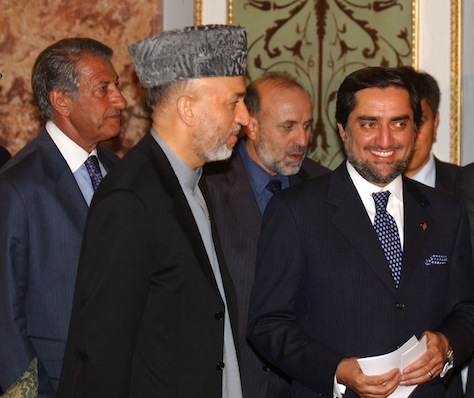In what must be one of the world’s slowest vote-counting exercises, most of the results of Afghanistan’s April 5 election have now been tallied, and frontrunner Abdullah Abdullah’s lead is growing in his bid to succeed outgoing president Hamid Karzai.![]()
With around 82% of the votes now counted, Abdullah leads with 43.8%, followed by Ashram Ghani Ahmadzai, a former World Bank official and finance minister, who is winning 32.9%. Zalmai Rassoul, until recently Karzai’s foreign minister, was in third place with 11.1%.
Though Abdullah’s lead has grown steadily throughout the vote count, he won’t achieve the absolute majority he would otherwise need to avoid a runoff against Ghani, which would take place after May 28 — likely in June.
* * * * *
RELATED: Afghanistan hopes for calm as key presidential election approaches
* * * * *
A report in The New York Times over the weekend indicated, however, that Abdullah (pictured above with Karzai in 2004) is already on the verge of winning Rassoul’s support, which could power Abdullah to a convincing runoff victory against Ghani by bringing southern Pashtun tribes close to Karzai into his ethnic and political coalition. Though the outgoing president hasn’t endorsed a candidate in the race, Rassoul is widely seen as the candidate of the Karzai administration, and Karzai’s brother, Quayum Karzai, dropped out of the race in March and endorsed Rassoul.
In the meanwhile, despite some horrific violence in the weeks leading up to the election, the Taliban, which is boycotting the vote, has been remarkably quiet, notwithstanding expectations that it would be working hard to undermine safety during the election campaign. Some analysts believe that the Taliban is waiting until the runoff vote to achieve maximum disruption, but the lull might actually mean that Abdullah and Ghani and their supporters are negotiating behind the scenes with key Taliban leaders.
So what does this mean for Afghanistan — and for the US military presence there? Continue reading Afghan election results: Abdullah lead grows


